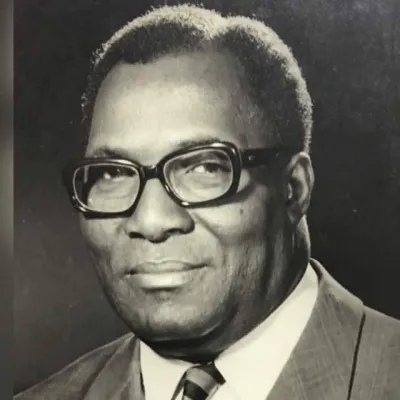Azu Crabbe And Our Judges – By EMEKA OBASI

Justices of the Supreme Court of Nigeria should know Samuel Azu Crabbe, Chief Justice of Ghana between 1973 and 1977. He stood his ground when many feared Jerry Rawlings and Kojo Tsikata were going to intimidate him. The judge delivered justice.
Azu, which stands for back or fish in Igbo, was appointed Chairman of the Special Investigation Board ( SIB) that looked into the murder of three top Ghanaian judges, Cecilia Koranteng–Addow, Frederick Poku Sarkodee, Kwadjo Agyei Agyepong and retired Army major, Sam Acquah.
They were taken from their respective homes on June 30, 1982, shot, and their bodies set ablaze by elements associated with President Jerry Rawlings. Individually, they had ruled on cases that diminished the Ghanaian leader in his first coming.
When Rawlings came in 1979, he wiped out three former Ghanaian Heads of State, Generals Okatakye Afrifa, Kutu Acheampong and Fred Akuffo. Service Chiefs, Joy Amedume and Ebenezer Kotei were not spared.
The Flt. Lieutenant flew out of power but returned in 1981 after sacking President Hila Liman. Some members of his Provisional National Defence Council ( PNDC ) ignited another reign of terror, targeting perceived anti–revolutionaries.
Tsikata, a Sandhurst-trained retired Army Captain, was Head of National Security. Amartey Quaye belonged to the Workers Union. Sgt. Aloga Akata Pore represented the non-commissioned officers who begged for more blood. It was almost certain that they knew about the extrajudicial killings.
Azu’s SIB indicted them all and recommended their trial. Tsikata leaned towards revolutionary Marxism and had served with United Nations Peacekeepers in the Congo alongside Arthur Ankrah. President Kwame Nkrumah mandated them to protect Patrice Lumumba.
At the SIB, Azu stood firm like a man. His life was threatened, the power supply to his residence was cut off, and one of the children living in the UK received messages that her father would be killed. The retired judge even engaged Tsikata in a verbal war publicly.
In 1983, Quaye, Pore and two others were sentenced to death and executed by firing squad. Rawlings set himself free by extracting a confession from Quaye just before the guns boomed. Tsikata survived the trial but not public condemnation.
One of Tsikata’s students at Achimota College, Obed Asamoah, ended up as Ghana’s longest-serving Minister of Foreign Affairs. At the 1985 ECOWAS Summit, he verbally pounced on Gen. Muhammadu Buhari for maltreating his countrymen in Nigeria.
Tsikata was dreaded as a cat with nine lives. He had been sentenced to death in Ghana earlier, following a coup tagged ‘ Operation One Man One Matchet’. His Ewe code – -the
name was ‘Gbagbladza’ ( cockroach). Coup leader Brig. Khattah escaped.
The same sentence was handed out in Conakry, where he had gone to visit ousted Nkrumah. The Guineans accused him of trying to assassinate the Osagyefo. It took the intervention of Mozambique’s Samora Machel to whisk him away to Angola to fight for Agostino Neto’s MPLA.
Justice Azu Crabbe shared the same November 18 birthday with Gen. Philip Effiong, the last President of Biafra. Tsikata did the same with Dr. Goodluck Jonathan on November 20. The judge died in Aburi, Eastern Region of Ghana, in 2005. Peduase Lodge, Aburi, was where Gen. Ankrah took Cols Yakubu Gowon and Emeka Ojukwu for peace talks in 1967.
Nigerian Supreme Court judges may not know that a Lagosian, Augustus Molade Akiwumi, was so good that Ghanaians chose him as the second Speaker of their Parliament in 1958. After that, he was made a Supreme Court Justice.
The late Justice Mohammed Muntaka Coomassie had something to say about Ghana. The name is the same as Kumasi, where the patriarch of the family, Ahmadu Coomassie, attended Catholic School. The senior Coomassie was the first Northern Nigerian Permanent Secretary.
Female Justices of the Supreme Court of Ghana have done better than their counterparts in Nigeria or are luckier. So far, three of them have served as Chief Justices. Georgina Theodore Wood was the 24th, Sophia Akuffo followed as the 25th before Gertrude Araba Torkorno assumed office as the 27th Chief Justice of Ghana. In Nigeria, only one woman, Mariam Alooma Mukhtar, was so elevated.
Azu Crabbe was the 17th Chief Justice of Ghana but the fifth since independence in 1957. Two steps ahead of him, in the 15th position, was Justice Edward Akufo Addo, President of Ghana, between 1970 and January 13, 1972. He was the father of President Nana Akufo Addo.
I look forward to the day a former Chief Justice of Nigeria will serve as President. I would not know why they avoid front-door politics. We should encourage them to canvass for votes when they drop the robe.
We may also try an exchange programme with Ghana. We had Egbert Udo Udoma in Uganda, Akinola Aguda in Botswana and Emmanuel Ayoola in The Gambia. These two countries can learn so much from each other. We gave them Akiwumi in 1960. Who are they giving us now?
The four judges who were murdered in Ghana are celebrated as martyrs every June 30. The matter now is who will be martyred in Nigeria. If Justices of the Supreme Court were assassinated in Accra, we should not assassinate the law in Nigeria.
